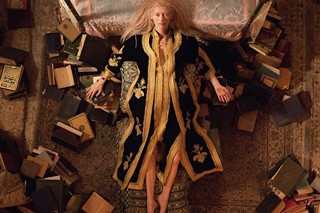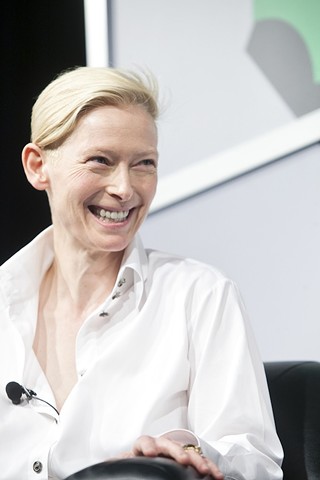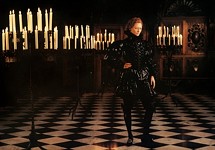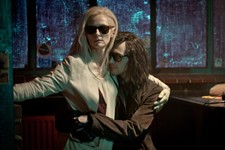Tilda Swinton and Jim Jarmusch Go Together Like Cream
The actress dishes on ‘Only Lovers Left Alive'
By Marc Savlov, 8:00AM, Thu. Apr. 24, 2014
OPEN IMAGE GALLERY

Tilda Swinton is, I’m glad to say, every bit as luminous and ethereal in person as she appears onscreen.
From her groundbreaking experimental work with the late Derek Jarman to her slinky-sinister role as a louche, book-enamored, and three-thousand-year-old vampire in Jim Jarmusch’s Only Lovers Left Alive, Swinton is never anything less than mesmerizing to watch.
This quality has not gone unnoticed – she won an Oscar at the 2007 Academy Awards for Best Supporting Actress in the film Michael Clayton, and her harrowing turn in 2011’s We Need to Talk About Kevin was nothing less than a masterful tour de force. (Visit “Mother’s Little Helper” for our interview with Swinton regarding Kevin.) Even in lesser films – such as the comic book adaptation Constantine, in which she played the angel Gabriel, replete and resplendent in prosthetic wings – Swinton rises to the top and imprints herself on viewers’ memories. She is, perhaps above all, a cineaste’s dream come true, fearless and otherworldly, and seemingly game for anything. And to think she’s never had any formal training besides that which she absorbed while serving as muse to the British experimental/indie filmmaker Derek Jarman in nearly a dozen shorts and features from 1984 to the director’s untimely death in 1994.
The Austin Chronicle spoke with Swinton prior to her appearance in March at South by Southwest to promote her latest movie Only Lovers Left Alive, which opens Friday, April 25 at the Arbor Cinema @ Great Hills and the Violet Crown Cinema. (See the Chronicle’s Film Listings for our review and showtimes.
Austin Chronicle: You’ve worked with Jim Jarmusch, on Broken Flowers, The Limits of Control, and now Only Lovers Left Alive. How has that relationship evolved? Tilda Swinton: He’s a friend of mine and it’s just like cream working with him. It’s so easy. It helps, of course, when you’re chewing something through over many years, as we did with this, because then when you get to shoot it you’re just laying down what you’ve been working on for eight years. AC: So you two have been discussing Only Lovers Left Alive for almost a decade? TS: He says it’s seven but I think it’s eight or nine years. But it takes as long as it takes sometime, you know? I don’t regret any of that pre-time because it all came together at the right moment really, as it always does. He’s a very interesting artist, Jim, because he’s a musician and, I would say, not being a musician myself but knowing musicians, that he makes films like a musician. He’s very clear about his own instrument, if you like, and his own authorship. But he’s really dedicated to the band and he knows that he’s taking a group of people to make this sound. He’s really respectful of how much he needs us all, but he drives it. And that’s really a lovely thing. He’s also capable of saying he doesn’t know when he doesn’t know, which is a great help. I just love working with him. AC: Amidst all of the current vampiric and undead pop-cultural debris we’re floating in, what was it about playing the role of a vampire that attracted you? TS: It just seemed completely inevitable to me somehow. I mean, when Jim first rang me up and said, “Hey man, let’s make a vampire film,” my first reaction was, “Hang on, haven’t you been making vampire films all along?” It feels like Mystery Train’s a vampire film, Night on Earth,, all of them. The thing that was really compelling, though, was that it was a love story. It was about lovers, and I didn’t feel that I’d seen that before from Jim, and it was really thrilling to step into that territory with him. I mean, they are human, or they were human before they were vampires, and so AC: Your character is named Eve and Tom Hiddleston’s character is named Adam. Is that supposed to be literal? It’s kind of a tease that’s never responded to. TS: The basic germ of the idea started with a book called The Diaries of Adam and Eve: Translated by Mark Twain, which is a beautiful and very playful thing. They are Adam and Eve in [the book], so, you know, go figure. Perhaps they are. AC: How did you come to structure the emotional vibe of Eve in Only Lovers Left Alive? It’s an immensely striking performance, almost along the lines of Udo Kier’s performance in Andy Warhol’s Dracula. TS: Wow, what a huge compliment! Eve has this perspective which I imagine you might have if you’d lived for 3,000 years. It’s a perspective on life that is such a clear thing. She doesn’t sweat not only the small stuff but the medium stuff, the big stuff, or any of it. She can see the long view and she knows what’s worth focusing on and what’s not. You don’t have to be 3,000 years old to have this sort of perspective. I was blessed to have a grandmother who died when she was 97 years old and who inspired me and continues to this day to inspire me. She had a tremendous amount of wonder and of gratitude and joy and for looking for the thrill in pretty much anything. She had a great phrase, which was “Dull not to.” It would be raining out and you’d ask “Shall we go take a walk?” and she’d say “Dull not to,” or it’s 8 o’clock in the morning: “Should we have a glass of Champagne?,” and she’d say “Dull not to.” That was her default position, and so she was definitely in my mind when I was thinking about Eve. AC: Apart from Derek Jarman and Jim Jarmusch, which directors have you connected with most? That rare, almost psychic bond between director and actor always shines through onscreen, and you seem to have it more than most. TS: Tricky question, really. In the first instance, I was blessed to meet Derek Jarman because he was the person who made it even possible to even be in films, because until I met him I was not wanting to be a performer at all. He gave me this sort of kindergarten in which I could work out by doing films. It wasn’t by interpreting a role or any of that professional stuff that I wasn’t really interested in. And then he died 20 years ago last month, and that was not only a major downer for all of us, but also it might have left me up a gum tree because you would think it was unique to get to work that way with someone. But the real miracle is that there have been these other people who’ve turned up and have wanted to work in a similar way. So there are, really, a great string of people from Lynn Herschman [!Women Art Revolution] whom I’ve worked with several times to now Wes Anderson [The Grand Budapest Hotel and Moonrise Kingdom], Jim Jarmusch, Lynne Ramsay [We Need to Talk About Kevin], Luca Guadagnino [I Am Love], Erick Zonka [Julia]. It is really a blessing. I think there is something similar in the way that I’ve worked with them all, which is basically we just play and they’re friends of mine. That’s the bottom line, those friendships.Having said that, there are other people who I kind of went into a deal with in a slightly professional way, such as Tony Gilroy [Tony Gilroy], the Coen brothers [Burn After Reading], and David Fincher [The Curious Case of Benjamin Button], and they also have become my friends. Those were films that were going to happen anyway, whether I was involved or not. I was cast in a role, I was there as a performer, and I didn’t have to help them write the script or raise the money or anything. And still it was playful and fun, we had a laugh and they’ve now become friends. I was never taught how to act or anything, but instead I learned very early on how to make friends.
AC: That sounds like the perfect way to do what you do. TS: I think that any other way you probably need a modicum of skill and something that you can rely in by yourself. I only know how to work with people that kind of put things together in a hotel room and then bring them on to the set, which I think is something professionals very often do. And I’m not professional in that way. AC: What were you doing before you met Derek Jarman and embarked on this fantastical career? TS: I went to university to be a writer and then got an exhibition to be a writer, but when I got there I immediately stopped writing and sideways started to be in performances with my friends. I left university in a very half-hearted way, thinking that I might perform, but very quickly realized that I didn’t want to be, for example, in the theatre. We’re talking 1984 and at that time there wasn’t really a kind of independent cinema in the UK. So I was really on the verge of not performing at all when I went to meet Derek Jarman. He gave me this, you know, free space in which to explore and experiment and we ended up making seven films together over nine years, and of those seven, four of them were silent Super-8 films, which meant that I was improvising and co-authoring them. It was a very unorthodox and, again, ramshackle world. I can’t imagine that if I hadn’t met him that I would have been performing at all. AC: Alongside director Apichatpong Weerasethakul [Uncle Boonmee Who Can Recall His Past Lives], you co-curated a rather spectacular film festival in 2012, Film on the Rocks, on the island of Ko Yao Noi, Thailand. How did that come about? And is it still extant? TS: These sort of events are only ever meant to be random and unexpected and unique. We just did another one in the Maldives which, again, was completely unexpected and random and unrepeatable. Who knows when I’ll do another one, but they started when I started making film festivals in Scotland. I made one in the small town where I live, in a bingo hall, and it was so wonderful we wanted to repeat it the following year. For boring reasons, we couldn’t use our bingo hall and so we got hold of a mobile cinema and pulled it across Scotland. The year later, we made one in Beijing, and then a year later we had the opportunity to make one in Yao Noi. So, yeah, they’re just completely random, unexpected, ramshackle events. AC: Happenings. TS: Yes! “Happenings” is exactly the word we use. AC: Your film The Beach was shot in Thailand, right? TS: Right. I have a very fond relationship with Thailand because my children were a year old at that time and they learned to swim there and ran around naked for six months in Phuket and it was amazing. I’ve got a very sort of tender spot in my heart for Thailand.A note to readers: Bold and uncensored, The Austin Chronicle has been Austin’s independent news source for over 40 years, expressing the community’s political and environmental concerns and supporting its active cultural scene. Now more than ever, we need your support to continue supplying Austin with independent, free press. If real news is important to you, please consider making a donation of $5, $10 or whatever you can afford, to help keep our journalism on stands.
Marjorie Baumgarten, Jan. 30, 2012
Marc Savlov, Dec. 30, 2014
Monica Riese, March 12, 2014
Aug. 7, 2022
April 29, 2022
Tilda Swinton, Only Lovers Left Alive, Jim Jarmusch, Derek Jarman, Apichatpong Weerasethakul












